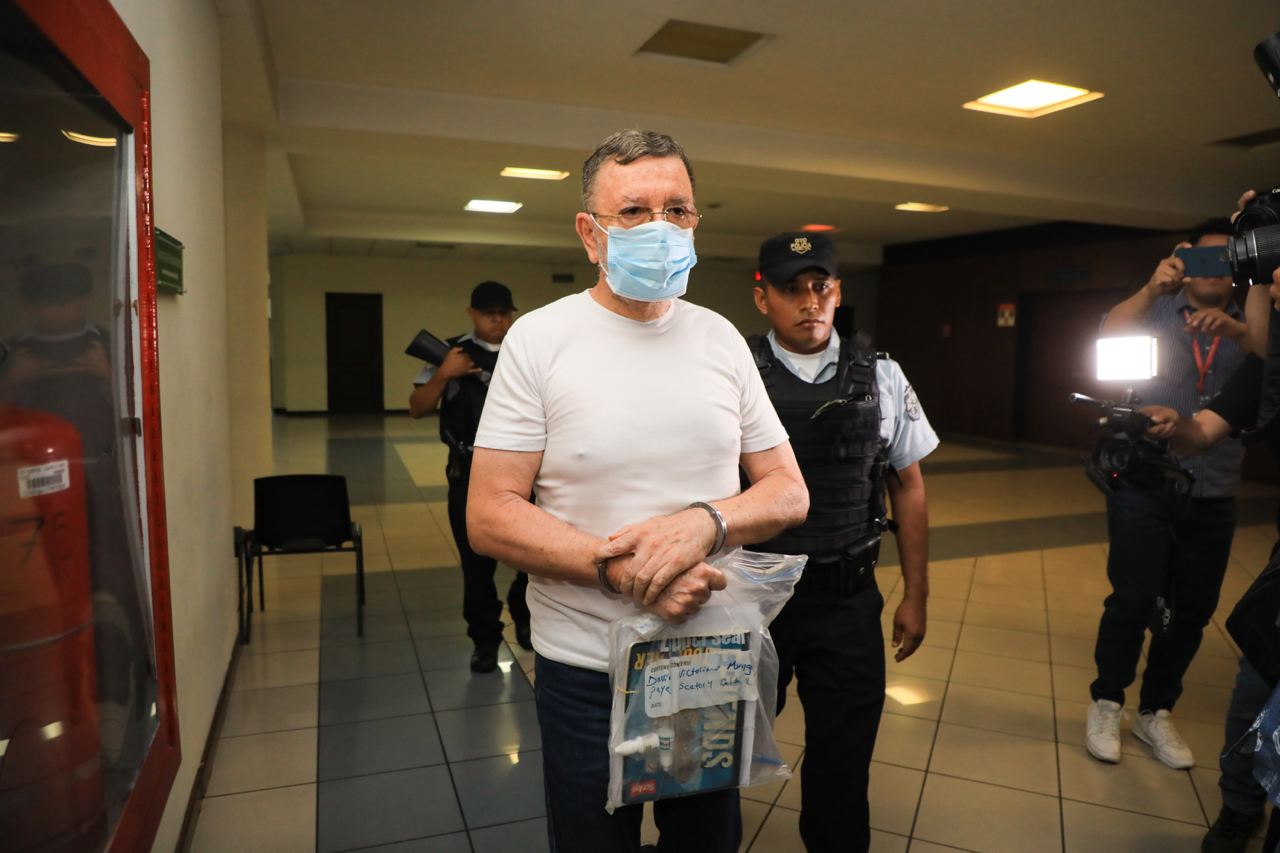Central America
Witness details how weapons entered prisons during the truce

May 2 |
Today, this public hearing continued with the appearance of the first six of 42 witnesses, the Specialized Sentencing Court C, in San Salvador, continued, this Tuesday, with the public hearing against former President Mauricio Funes and former Minister of Security, David Munguía Payés, in the case “Truce between gangs”, through which the FMLN government granted benefits to the gangs in exchange, allegedly, to stop attacking the Salvadoran population.
Among the first six witnesses are the heads of the monitoring and intelligence center, and the deputy directors of security at the Izalco prison in Sonsonate and the Zacatecoluca prison in La Paz. All the witnesses are part of a group of 30 people summoned by the Attorney General’s Office.
The six witnesses confirmed the granting of benefits for gang members held in both prisons and meetings to plan, together with the leaders in prison, the actions of the gang members who were on the street, all of which were endorsed by Munguia Payes and the former president.
“I want to denounce seven illegal acts committed by the authorities of the prisons, the Ministry of Security and the government during the period of the truce: One was the entry of mediators without registration; the departure of gang members, clique leaders, to other prisons to meet with other leaders; intimate visits without due permission and procedure; the entry of discos to entertain parties inside the prison; the entry of scantily clad dancers; the simulation of searches and the removal of machines that had information on everything carried out in the prison,” said the former deputy director of security at the Izalco prison.
According to the witness, all of these actions were endorsed by the director of the prison, Juan José Zepeda, and the director of prisons, Nelson Rauda, who received orders from both defendants.
“These people asked the so-called mediators of the truce, who at the beginning were Monsignor Fabio Colindres, Raul Mijango, Roberto Diaz and various street gang leaders, to enter without going through the three security rings,” the witness said.
As well as the deputy director of security at the Izalco prison, one of the people in charge of the monitoring and intelligence center at the prison also pointed out how the mediators, and those who met with the gang members, brought food and objects to Fabio Colindres, Raul Mijango, Roberto Diaz and Father Toño, as Antonio Rodriguez Tercero, a Passionist priest, is known.
In addition to detailing how these weapons would have been brought into the Izalco prison, through the punching bag, both said that the supposed mediators always arrived with briefcases and bags and that when they tried to be searched, they always made calls so that the security guards in charge of the prisons would be ordered to let them pass without any procedure or review.
“On one occasion a simulated search was carried out, these were not programmed, on that occasion 50 cell phones were located in sectors 1 and 2 of the Izalco prison, however, none of these were reported, and at the end of the search all were returned to the gang members,” said the deputy director of security at the Izalco prison.
The Specialized Sentencing Court C of San Salvador expects the public hearing to last five days. During this period, 30 witnesses are expected to appear, and one of Munguia Payes’ defense attorneys has reported that they will present between 10 and 12 witnesses to refute the accusation.
Central America
Guatemala President Says Starlink Terminal Found Inside Prison

Guatemalan President Bernardo Arévalo revealed on Tuesday that a Starlink terminal was discovered inside a prison in the country, highlighting corruption and the illegal introduction of advanced communication technology into the penitentiary system.
Arévalo did not specify which prison the device was found in but stressed that Starlink’s ability to connect directly to low-orbit satellites makes it particularly difficult to disrupt, posing a serious security risk.
The disclosure was made during a press conference attended by Interior Minister Marco Antonio Villeda and Defense Minister Henry Sáenz.
On January 6, specialized units of Guatemala’s National Civil Police (PNC), members of the Army and prison security personnel carried out Operation Sentinel at the Renovación 1 Maximum Security Prison for Men, located in Escuintla. According to the Interior Ministry, the operation aimed to reduce criminal activity, prevent illicit acts and stop the trafficking of prohibited items inside the prison.
During the operation, authorities also dismantled businesses operating near several prisons after detecting routers that were allegedly used to redirect internet signals into penitentiary facilities, according to local outlet Emisoras Unidas.
Tensions escalated further over the weekend of January 17 and 18, when inmates affiliated with gangs staged riots in three prisons. During the unrest, they took prison guards and a psychologist hostage, demanding extra-large beds, air conditioning, transfers to other facilities and access to the internet.
Central America
Guatemala Police Arrest Prison Guard Caught in the Act of Extortion

Guatemala’s National Civil Police (PNC) arrested a suspected extortionist in the act during an operation carried out in the department of Quiché, authorities reported.
According to the police report, the arrest took place in Zone 1 of Santa Cruz del Quiché after officers responded to a citizen complaint. Agents from Precinct 71 identified the suspect as Encarnación “N”, 41, who was serving as a guard in the Guatemalan Penitentiary System.
The suspect was caught while attempting to collect a package simulating an extortion payment totaling 25,000 quetzales. Police intervened at the precise moment the money was being handed over, allowing authorities to document the crime in flagrante delicto.
Following the operation, the detainee was placed at the disposal of the competent courts to face criminal proceedings.
The PNC emphasized that such operations aim to dismantle criminal structures involved in extortion, regardless of whether those implicated are linked to state institutions, and urged the public to continue reporting these crimes through confidential channels.
Central America
Honduras swears in conservative president Asfura after disputed election

Conservative politician Nasry Asfura assumed the presidency of Honduras on Tuesday with an agenda closely aligned with the United States, a shift that could strain the country’s relationship with China as he seeks to confront the economic and security challenges facing the poorest and most violent nation in Central America.
Asfura’s rise to power, backed by U.S. President Donald Trump, marks the end of four years of left-wing rule and secures Trump another regional ally amid the advance of conservative governments in Chile, Bolivia, Peru, and Argentina.
The 67-year-old former mayor and construction businessman was sworn in during an austere ceremony at the National Congress, following a tightly contested election marred by opposition allegations of fraud and Trump’s threat to cut U.S. aid if his preferred candidate did not prevail.
Grateful for Washington’s support, Asfura—who is of Palestinian descent—traveled to the United States to meet with Secretary of State Marco Rubio, before visiting Israeli Prime Minister Benjamin Netanyahu.
“We need to strengthen relations with our most important trading partner,” Asfura said after being declared the winner of the November 30 election by a narrow margin, following a tense vote count that lasted just over three weeks.
-

 Central America3 days ago
Central America3 days agoGuatemala seizes over a ton of cocaine hidden in flour at Pacific port
-

 International4 days ago
International4 days agoDelcy Rodríguez seeks political agreements after Maduro’s ouster
-

 International3 days ago
International3 days agoHistoric snowstorm paralyzes Toronto after 60 centimeters of snow
-

 International3 days ago
International3 days agoSpain’s irregular migrant population rises to 840,000, study finds
-

 International4 days ago
International4 days agoFederal immigration agents kill man in Minneapolis, sparking protests and outrage
-

 Central America2 days ago
Central America2 days agoGuatemala Police Arrest Prison Guard Caught in the Act of Extortion
-

 Central America2 days ago
Central America2 days agoHonduras swears in conservative president Asfura after disputed election
-

 Central America2 days ago
Central America2 days agoBukele leads public trust rankings as UCA survey highlights gains in security
-

 International15 hours ago
International15 hours agoFootball Fan Killed in Clashes After Colombian League Match
-

 International2 days ago
International2 days agoWinter Storm Fern Leaves 30 Dead and Over One Million Without Power Across the U.S.
-

 Sin categoría2 days ago
Sin categoría2 days agoEight Killed in Series of Armed Attacks in Ecuador’s Manabí Province
-

 International2 days ago
International2 days agoDoomsday clock moves to 85 seconds before midnight amid rising global risks
-

 International3 days ago
International3 days agoRights group says nearly 6,000 killed in Iran protest crackdown
-

 International2 days ago
International2 days agoSpain approves plan to regularize up to 500,000 migrants in Historic Shift
-

 International15 hours ago
International15 hours agoRubio Says U.S. Could Participate in Follow-Up Russia-Ukraine Talks
-

 International3 days ago
International3 days agoVenezuela frees at least 80 political prisoners, NGO says
-

 Sin categoría2 days ago
Sin categoría2 days agoEl Salvador Launches Fourth Year of Ocean Mission to Protect Marine Ecosystems
-

 International15 hours ago
International15 hours agoMissing Spanish Sailor Rescued After 11 Days Adrift in Mediterranean
-

 International3 days ago
International3 days agoEU launches new probe into X over AI-generated fake nude images
-

 Central America15 hours ago
Central America15 hours agoGuatemala President Says Starlink Terminal Found Inside Prison
-

 International3 days ago
International3 days agoFrance debates ban on social media for children under 15
-

 International3 days ago
International3 days agoSevere winter storm grips U.S., leaves multiple dead as extreme cold persists


























